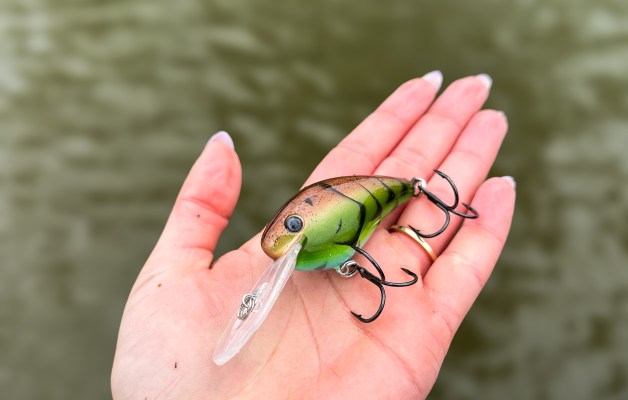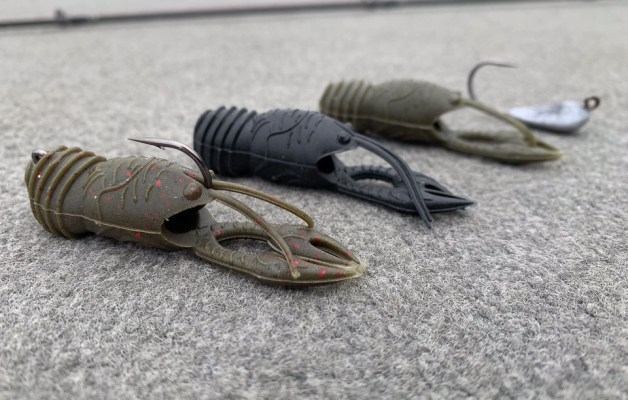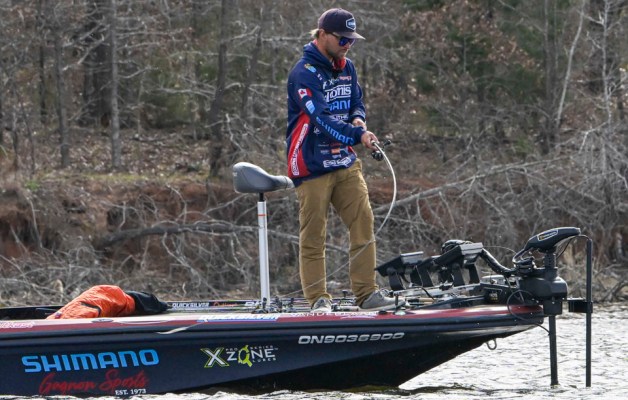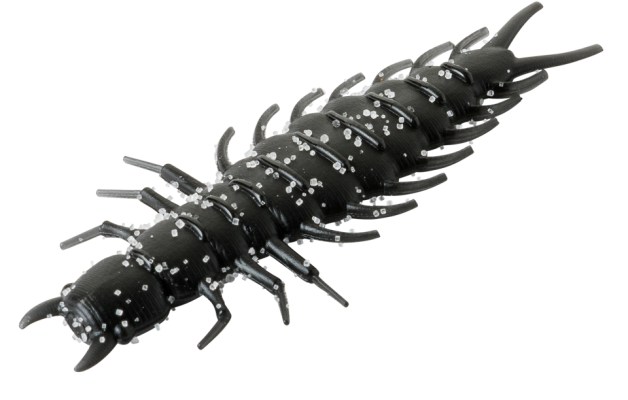
Mike McClelland of Bella Vista, Ark., had no way of predicting his future, but the foundation of his bass fishing future was built at Table Rock Lake, beginning when he was 9 or 10 years old, when he was “fishing with people who knew what they were doing.”
That included an uncle who worked as a guide on Table Rock.
“I remember we threw a Wiggle Wart (crankbait) or a spinnerbait or a plastic worm,” said the 46-year-old McClelland. “In the spring, during prespawn, it was just two baits, a Wiggle Wart and a spinnerbait.
“My uncle wouldn’t start guiding each year until the water temperature hit 52 degrees.”
That generally was the water surface temperature at Table Rock Lake when the Bassmasters Elite Series arrived last week.
Rather than reminiscing about past experiences here, Mark Davis of Mt. Ida, Ark., was thinking of the future. As part of the Strike King pro staff, Davis gets to use some lures that haven’t made it to market yet, as well as everything else in the Strike King catalog. One that isn’t on the market – the Strike King River Bug – a soft-plastic with a Beaver type body and a couple of long, flat crawfish-type appendages, had been Davis’ main weapon on the spawning bass at both Lake Seminole and the St. Johns River, where Davis opened he season with two third-place finishes.
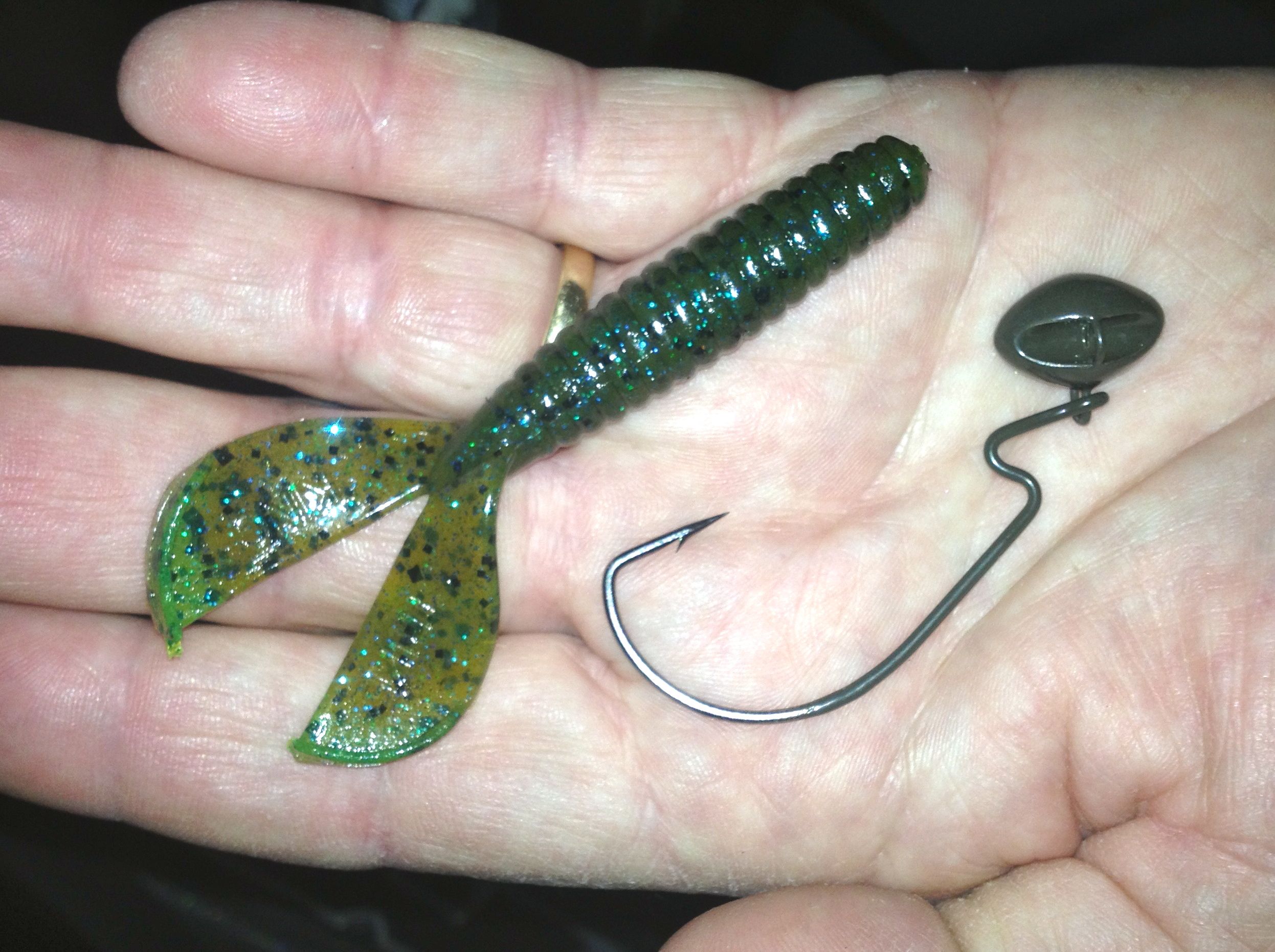 In the two weeks off between the St. Johns River and Table Rock, Davis put together a plan. He’d found out that the River Bug was made to be fished on a “swing jig,” where the hook pivots freely from the lead head of the jig. He’d Texas rigged it in the first two tournaments. And Davis was thinking about using another Strike King soft plastic lure – the Rage Tail TwinTail Menace grub. He’d always Texas rigged it, but Davis liked the idea of fishing it on a swing jig. So he tried the combo at Lake Ouachita, near his hometown.
In the two weeks off between the St. Johns River and Table Rock, Davis put together a plan. He’d found out that the River Bug was made to be fished on a “swing jig,” where the hook pivots freely from the lead head of the jig. He’d Texas rigged it in the first two tournaments. And Davis was thinking about using another Strike King soft plastic lure – the Rage Tail TwinTail Menace grub. He’d always Texas rigged it, but Davis liked the idea of fishing it on a swing jig. So he tried the combo at Lake Ouachita, near his hometown.
“I caught a bunch of fish on it,” Davis said.
McClelland had a few more lures, in addition to the Wiggle Wart, in his tacklebox last week during the A.R.E. Truck Caps Bassmaster Elite Series Tournament on Table Rock. His list of lures included, of course, one of his signature baits – a SPRO McStick jerkbait. But the Storm Wiggle Wart crankbait remained a key for McClelland and just about everyone else in the field.
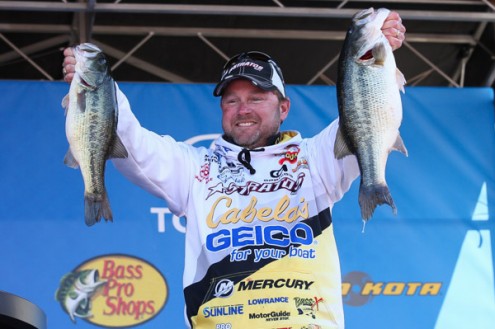 The Bella Vista, Ark., resident weighed 61 pounds, 15 ounces in notching his seventh B.A.S.S. win. First place paid $100,000 and included an automatic qualification for the 2015 Bassmaster Classic.
The Bella Vista, Ark., resident weighed 61 pounds, 15 ounces in notching his seventh B.A.S.S. win. First place paid $100,000 and included an automatic qualification for the 2015 Bassmaster Classic.
“I was sweating it,” said McClellnd of the final day, when he weighed only 12-2. It was his smallest bag of the week.
He was sweating because Davis stayed right with McClelland on the leaderboard all day long. He’d end as the runner-up with a too-close-for-McClelland’s-comfort total of 61-2 – a mere 13 ounces way from matching the winning total. McClelland entered the final day with almost a 4-pound lead over his closest competitor. He’d need almost every ounce of that cushion.
Sunday’s final marked the only day that McClelland didn’t weigh at least 15-6, which came Thursday. He caught bigger bags the next two days in building a lead over the rest of the field.
McClelland was basically fishing his roots. The old Storm Wiggle Warts were a key element in his gameplan. So was the suspending jerkbait. Legendary B.A.S.S. angler Rick Clunn told me during Wednesday’s registration at Big Cedar Lodge that there was no such thing as a jerkbait until a bunch of anglers in the Ozarks started altering what were then-known as “twitch baits,” like the Smithwick Rogue. The jerkbait was born when the Ozarks’ old-timers started drilling holes in the twitch baits and filling them with lead, or wrapping lead wire around the base of the treble hooks. It gave the Rogue and other floating lures a neutral buoyancy. Instead of slowly floating back to the water surface, you could crank these altered twitch baits down into or near a submerged cedar tree, and it would sit there enticingly.
After a series of spring tournaments were won on suspending jerkbaits, the fishing industry recognized the need and created jerkbaits that suspended straight out of the package. No drills or lead needed,
The SPRO fishing corporation and McClelland signed an agreement several years ago to create a signature series of suspending jerkbaits. They’re called McSticks. There’s a McStick 110 and the McStick 115, which is a bigger model of the 110. Both produced key catches for McClelland at Table Rock, especially Thursday and Friday, He used a clear chartreuse color pattern on the 115 to work shallow areas along the bank. He selected a natural herring color in the 110 for catching suspended fish on the outside edge of rock banks.
For the McStick 110, McClelland uses Sunline Reaction FC 12-pound test. For the 115, he goes up 14-pound test in Sunline Reacton FC. He prefers that line for jerkbaits because it’s not 100 percent fluorocarbon, so it has a bit of stretch.
 Davis was able to stick with plan A: the Menace with the football head swing jig – both in green pumpkin – until the final hours on Sunday. He was essentially swimming the combo – making long casts and slow, steady retrieves. The lure was kept near the bottom, bumping it occasionally.
Davis was able to stick with plan A: the Menace with the football head swing jig – both in green pumpkin – until the final hours on Sunday. He was essentially swimming the combo – making long casts and slow, steady retrieves. The lure was kept near the bottom, bumping it occasionally.
“I caught one on the first cast (at Table Rock),” Davis said. “A 3-pounder just clocked it. And they just kept eating it.
“The main thing is I think it was just something new that they hadn’t seen before. When I was hunting for fish, I’d make long casts and fish it more like a crankbait. When I’d find the fish, I’d slow down and fish it more like a jerkbait. You can cover a lot of water with it, and you don’t ever have to pick up another rod.”
It was both a big-fish bait – Davis caught a 7-3 on Thursday when he took the top spot on the leaderboard with a five-bass bag of 18-3, and it was a numbers lure: He was getting 60 to 100 bites every day. But, on Sunday when Davis needed a fish of 6 or 7 pounds to overcome McClelland’s lead, Davis switched to a Strike King 3XD green crawfish-colored crankbait. In a way, it was a tip of the hat to Storm’s Wiggle Warts.
“I didn’t fish with anything else for those last three hours,” Davis said. “And I caught another 60-or-so fish.”
But he never hooked a bass that would have put him over the hump against McClelland.
In 2004 when Davis won an Elite Series tournament at Table Rock, he did it with some help from a friend. Former B.A.S.S. competitor Jeff Fletcher loaned Davis a few Wiggle Warts. They played a key role in Davis’ victory,
“I think there are some crankbaits out there now that are just as good or better than Wiggle Warts,” Davis said.
Maybe so. But there were a lot of bass caught again on Table Rock Lake with the old-time traditional Wiggle Warts. Just ask Mike McClelland.

